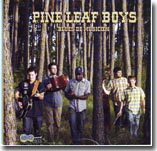 The Pine Leaf Boys' Blues de Musicien (Arhoolie) is a great album that runs the risk of being overlooked just
because the lyrics are in French. And that’s a great shame because the
music is what counts and it is very very good.
The Pine Leaf Boys' Blues de Musicien (Arhoolie) is a great album that runs the risk of being overlooked just
because the lyrics are in French. And that’s a great shame because the
music is what counts and it is very very good.
The CD gets off to a flying start with the title track, and it’s a real
up tempo foot-tapper. If you can listen to this without tapping fingers,
or feet, or wanting to dance, then you don’t have any music in your
soul!
The boys slow down with the next track to let you catch your breath, and
then launch into a great version (in French, of course) of “The Wild
Side Of Life.”
This is followed by what is, to my ear and mind, the best track on the
album, and certainly the blusiest.
It’s called “Ma Petite Femme” – more than four minutes of pure Cajun
blues, with fiddle, tinkling piano, and a gently persuasive bass line
laid down by Blake Miller – it doesn’t come much better than this!
When you reach track seven, “Jig Cajin,” you’ll have to be out of your chair –
what an appropriately named track this is – close your eyes and you’re
in a Louisiana tavern with people dancing all around you!
If you want to keep dancing, then “Creole Mardi Gras” will give you the
impetus – yet another track that you can’t sit still to!
There are 14 excellent tracks here, full of feeling or full of fun –
take your choice.
If you love Cajun music, you’ll thoroughly love this CD – if you’re not
a fan, this might be enough to make you into one.
---
Terry Clear
 Roxanne Potvin may only be 24 years old, but she sings the blues like a
seasoned veteran. She recently teamed up with Sue Foley and Deborah
Coleman as part of Ruf Records’ 2007 Blues Caravan Tour, and has more
than held her own with that formidable duo. Possessing a sweet, sultry
voice that was born to sing blues and soul, Potvin seems destined for
big things. Her recent release on Ruf Records, The Way It Feels, offers
ample proof of her talents.
Roxanne Potvin may only be 24 years old, but she sings the blues like a
seasoned veteran. She recently teamed up with Sue Foley and Deborah
Coleman as part of Ruf Records’ 2007 Blues Caravan Tour, and has more
than held her own with that formidable duo. Possessing a sweet, sultry
voice that was born to sing blues and soul, Potvin seems destined for
big things. Her recent release on Ruf Records, The Way It Feels, offers
ample proof of her talents.
Produced by Grammy winner Colin Linden, who also plays guitar, dobro,
and mandolin on most of the tracks, The Way It Feels showcases Potvin
the composer and guitarist as well. She penned eight of the 12
tracks, including the opener, “A Love That’s Simple,” which sounds like
a lost Stax single and is made even better by the presence of John
Hiatt, who supplies harmony vocals. U2 producer Daniel Lanois, another
Grammy winner, duets with Potvin on her lovely folk tune, “La
Merveille,” and Canadian Music Hall of Famer Bruce Cockburn adds guitar
to “While I Wait For You.”
Other highlights include her angelic vocals on “Hurting Child” and “Let
It Feel The Way It Feels,” and her solo (accompanying herself on piano)
performance on “Don’t Pay Attention.” The covers include Joe Tex’s “I
Want To (Do Everything For You)” and Jackie DeShannon’s lively “Break
Away,” but the original compositions outshine the covers on this
release.
Known throughout Canada as “The Blues Ingénue,” Roxanne Potvin proves
she’s anything but that with The Way It Feels. This is a strong,
confident release by a youngster who’s going to be around a long time.
--- Graham Clarke
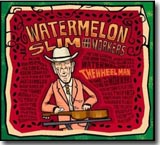 2006 was a banner year for Watermelon Slim. His self-titled debut
release for NorthernBlues was nominated for six Blues Music Awards,
including Album of the Year, Band of the Year, and Traditional Blues
Artist of the Year. It looks like Slim plans to continue his hot streak
into 2007 with his latest NorthernBlues release, The Wheel Man.
2006 was a banner year for Watermelon Slim. His self-titled debut
release for NorthernBlues was nominated for six Blues Music Awards,
including Album of the Year, Band of the Year, and Traditional Blues
Artist of the Year. It looks like Slim plans to continue his hot streak
into 2007 with his latest NorthernBlues release, The Wheel Man.
The same qualities that made Watermelon Slim’s previous releases so
compelling --- his gnarly, well-traveled vocals, his stellar efforts on dobro and harp, and most of all, his lyrical gifts
--- are all present on
this new release. The songs on The Wheel Man cover topics ranging from
love and lust (“Peaches,” “Truck Driving Mama,”), to crime and sin (a
cover of the traditional “Jimmy Bell,” “Fast Eddie,” and the title cut,
a great blues romp with special guest Magic Slim, who tears off one of
his barbed wire solos to perfectly complement Watermelon Slim’s soaring
slide work) to searing commentary on current events (“Black Water,”
which describes the horrible after-effects of Katrina). He also covers
the evils of driving impaired with “Drinking & Driving,” and a love gone
bad (“Rattlesnake”). There’s also a savory rendition of Slim Harpo’s
“Got Love If You Want It.”
Slim and the band (Ronnie “Mack” McMullen and Ike Lamb on guitar,
Michael Newberry on drums, and Cliff Belcher on bass) really shine, and
prove they are indeed deserving of their Blues Music Award nomination.
Piano man David Maxwell also stops by to add sparkling keyboards to
three tracks.
Watermelon Slim has worn many hats during his extraordinary life. He’s
fought in Vietnam, driven a truck, operated a forklift, worked in a
sawmill, sold firewood, directed funerals, and even dabbled in petty
crime. Given his recent body of work in the blues field, it’s safe to
say that he’s finally found his niche. Look for Watermelon Slim to make
a return appearance at the Blues Music Awards in 2008 on the strength of
The Wheel Man.
--- Graham Clarke
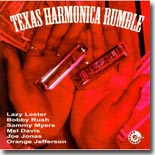 The Texas Harmonica Rumble was organized by Dialtone Records owner Eddie
Stout back in the ‘90s, running for four years in Dallas and then
relocating to Austin. The Festival did well enough to spawn three
European tours and one tour in Russia, and brought more exposure to many
great unsung harmonica players. Stout decided to put together a
collection featuring six of them.
The Texas Harmonica Rumble was organized by Dialtone Records owner Eddie
Stout back in the ‘90s, running for four years in Dallas and then
relocating to Austin. The Festival did well enough to spawn three
European tours and one tour in Russia, and brought more exposure to many
great unsung harmonica players. Stout decided to put together a
collection featuring six of them.
Texas Harmonica Rumble features
performances from a couple of artists you might be familiar with (Bobby
Rush, Sam Myers, and Lazy Lester), and a few that deserve to be heard
(Joe Jonas, Orange Jefferson, and Mel Davis).
Listeners may be unfamiliar with Orange Jefferson, but his two tracks
feature blues in the deep Lightnin’ Hopkins Texas blues style, with
gravelly vocals. Mel Davis, who has three tracks, is similar
stylistically, but has a smoother vocal style. Joe Jonas also has three
tracks, including the autobiographical “Blues From Beaumont Texas,” and
features Houston guitarist Little Joe Washington as vocalist on “Take
Off Your Shoes.”
As far as the familiar faces go, Lazy Lester tackles a couple of old
warhorses: Jimmy Rogers’ “That’s All Right,” and Jimmy Reed’s “Honest I
Do,” but he could play harp and recite the Austin phone book and it
would be worth a listen. Rush’s three selections are originals, though
not his usual salacious material, and include a tasty instrumental, “Hot
Air.” The two Sam Myers tunes, the instrumental “Brain Dead,” and Otis
Spann’s “Must Have Been The Devil,” are well done and could bring a lump
to your throat in light of his recent passing.
Support musicians include Mike Buck on drums, Eve Monsees on guitar,
Hash Brown on guitar, and Thierry Cognee on guitar. They, along with the
other musicians, provide sympathetic support to their respective frontmen,
and Stout’s production gives the proceedings a relaxed, downhome groove.
Fans of blues harmonica will be pleased to add this set to their
collection, another fine effort from Dialtone.
--- Graham Clarke
The Original Bells of Joy have been making beautiful gospel music for
over 40 years in a style reminiscent of the Soul Stirrers, Dixie
Hummingbirds, and the Pilgrim Travellers, even recording a
million-selling single for Duke/Peacock in the ‘50s (“Let’s Talk About
Jesus”), which charted #1 on the Billboard R&B Chart, a rare feat for a
gospel group.
Still going strong into the 21st Century, the group just
finished their second release for Dialtone Records, entitled The
Original Bells of Joy With Friends.
Most of the guest vocalists’ styles vary greatly from the Bells, but the
end product blends together perfectly.
Ely’s contributions to the
opening cut, “Sinner Man,” is very effective with the Bells’ incredible
harmonies, and Bobby Rush fits into their style seamlessly on “Any Way
You Bless Me.” Nelson’s idiosyncratic vocal style might have been a
challenge, but his appearance on the Bells’ gentle take on “I’ll Fly
Away” is one of the highlights of the disc. Singer/Songwriter Chip
Taylor wrote his contribution, “Son of Man,” and also contributes
plaintive vocals. His musical partner, guitarist John Platania adds
guitar to the track, and Rhodes shines along with the Bells on her
composition, “The Bells.”
Throughout, the Bells of Joy’s airtight harmonies (featuring Rev.
Glasco, A. D. Watson, Alton Cyphers, Terry Stewart, Theo Thompson, J. T.
Stewart, and West Bray,) and backing musicians (guitarists Stewart and
Bray, organist Nick Connolly, bassists Bryan Lott and Tracy Clark, and
Willis Littlefield on drums) carry the day. Their tracks, without the
benefit of guest stars, show that while friends are nice to have around,
the Bells are definitely capable of making wonderful music without them.
Fans of old time gospel soul will absolutely love this one.
--- Graham Clarke
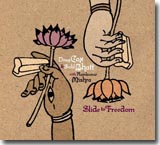 Doug Cox, who is one of Canada’s foremost slide guitarists, has teamed
up with one of India’s best slide instrumentalists, Salil Bhatt, to
create a breathtaking fusion of Blues and Indian music. Slide To Freedom
(NorthernBlues) was no hastily thrown together session, as Cox and Bhatt
actually have practiced and worked together for over a year before
actually recording. The time and care put into this effort is obvious
from the beginning.
Doug Cox, who is one of Canada’s foremost slide guitarists, has teamed
up with one of India’s best slide instrumentalists, Salil Bhatt, to
create a breathtaking fusion of Blues and Indian music. Slide To Freedom
(NorthernBlues) was no hastily thrown together session, as Cox and Bhatt
actually have practiced and worked together for over a year before
actually recording. The time and care put into this effort is obvious
from the beginning.
Cox’s specialty is the dobro, a fairly conventional instrument present
in many blues recordings, but Bhatt’s instrument, the satvik veena, has
20 strings, and will be a new sound to many blues fans. The interplay
between Bhatt and Cox is both haunting and beautiful as they give a
completely new look to old blues classics like Mississippi John Hurt’s
“Pay Day,” and Blind Willie Johnson’s “Soul Of A Man.” On the Johnson
track, and one additional track, “Father Kirwani,” Cox and Bhatt are
joined by Bhatt’s father and mentor, V. H. Bhatt. The elder Bhatt is a
Grammy winner, creator of the mohan veena (a 19-stringed instrument),
and has appeared on discs by Ry Cooder, Bela Fleck, Jerry Douglas, and
Taj Mahal, and is considered to be the cultural ambassador of India.
Percussionist Ramkumar Mishra adds strong support on tabla.
There are eight tracks on this CD, each highlighting the sparkling
interplay between Bhatt & Cox’s instruments. Though most of the songs go
into the eight-minute range, each subsequent listen brings out new
aspects of each song. According to the liner notes, the musicians sat
cross-legged in the middle of the studio, watching each other’s every
move. The close camaraderie formed between the musicians during this
project really pays off. The steely sound of the resonator mixed with
the reverberation and melody of the veena makes an appealing concoction.
I would be the first to admit that I know as much about Indian music as
I do about flying the space shuttle. However, after listening to Slide
To Freedom over the past few weeks, I can safely say that I want to hear
more. Most blues fans should feel the same way. Slide To Freedom is a
incredible journey into world music by a group of stellar musicians.
--- Graham Clarke
Tom Feldmann derives his musical style from the music of blues legends
like Son House, Mississippi Fred McDowell, and John Lee Hooker, but he
also digs deep into the traditional gospel-influenced sounds of the Louvin Brothers and Gram Parsons. His latest effort, with his band The
Get-Rites, focuses heavily on the gospel side of things, but Side Show
Revival (Magnolia Recording) will please fans of country blues and folk
as well.
Feldmann has a gruff, soulful vocal delivery that suits his material
well, all of which was either composed by him or derived from older
tunes. As mentioned, most of the emphasis is on gospel with a healthy
dose of blues delivered via Feldmann’s impressive resonator guitar and
the tight support of the Get-Rites (Jed Staack, drums and Paul Liebenow,
upright bass).
There’s a pleading urgency in Feldmann’s delivery on tunes like
“Converted,” “Jesus,” and “One of These Days,” but he sings with joyful
exuberance on songs like “Redeemed,” “Bought By The Blood,” and “Sing,
Dance, Shout.” Feldmann’s stirring medley “Old Time Religion/Heaven” is
also a standout. There are a couple of songs that deal with more secular
topics. These tracks, the edgy “10,000 Chains” and the beautiful
“Magdalene,” are as powerful as the gospel efforts. Feldmann is
obviously a gifted songwriter in several different genres.
Whatever your convictions may be, Side Show Revival is a dazzling,
heartfelt showcase of songwriting and performing by a talented
singer/composer/guitarist that is definitely worth a spin.
--- Graham Clarke
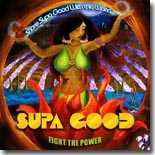 Strap in. Elam McKnight has returned to the recording scene with a
vengeance. After his more sedate acoustic team-up with Keith Carter,
McKnight has roared back with Supa Good (Desert Highway), a wild and
wooly gumbo of 21st century Hill Country Blues that grabs you by the
throat from the first track and hangs on for a solid hour.
Strap in. Elam McKnight has returned to the recording scene with a
vengeance. After his more sedate acoustic team-up with Keith Carter,
McKnight has roared back with Supa Good (Desert Highway), a wild and
wooly gumbo of 21st century Hill Country Blues that grabs you by the
throat from the first track and hangs on for a solid hour.
Dedicated to the memory of Hill Country Blues godfather R.L. Burnside,
Supa Good carries that form of music to a new level, with help from
Carter, drummer Sam Carr, guitarist Rick White (Screamin’ Cheetah
Wheelies), and keyboardist Ronnie Godfrey (Marshall Tucker Band). In
addition, the rhythm section, the West Levee Phantoms (former Rock City
Angel Ringo Jukes on drums and Dan Shaw on bass) really tear the house
down in support.
The opening cut, “Devil Minded Woman,” starts fast and then speeds up,
with Carter threatening to blow the back off his harmonica. “Love Me”
features a Hill Country backbeat combined with backup chick vocals and
more of Carter’s harp. “I Buried A Black Cat” is a rough and grungy
rocker, while “Kung Fu Power” is more of a Delta Blues number. “Hold You
Closer” is killer Memphis soul, complete with horn section. “Long Curly
Hair” sounds straight out of the Burnside repertoire. Other highlights
include “Pam Grier,” a lecherous and hilarious tribute to the sexy ’70s
film star, “Yo Mama Told A Tale,” and “If That Don’t Get ‘Em,” another
rocker.
Closing things out is a wonderful stripped-down tribute to Burnside,
Junior Kimbrough, Othar Turner, and other influences in McKnight’s life
and career, and “Big Daddy’s Lament,” a spoken-word/rap honoring
Burnside, which ends up being an extended “Thank You” shout-out to all
of McKnight’s friends and fans, sort of taking the place of the usual
liner note acknowledgements.
Supa Good is a thrilling ride from start to finish, and Elam McKnight’s
best release yet. R.L. would be proud.
--- Graham Clarke
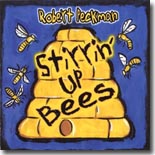 Robert Peckman and his band know how to lay down a solid, soulful
beat, with tight arrangements and a solid horn section. What's lacking
from this Pittsburgh-based ensemble on their independent disc,
Stirrin' Up Bees (Bonedog Records), is a vocalist that's suited for
the material. Bandleader Peckham is by no means a bad singer (he'd be
fine singing the blues with a smaller band), but his voice doesn't have
the power or depth needed out front of this band.
Robert Peckman and his band know how to lay down a solid, soulful
beat, with tight arrangements and a solid horn section. What's lacking
from this Pittsburgh-based ensemble on their independent disc,
Stirrin' Up Bees (Bonedog Records), is a vocalist that's suited for
the material. Bandleader Peckham is by no means a bad singer (he'd be
fine singing the blues with a smaller band), but his voice doesn't have
the power or depth needed out front of this band.
That's not to say there's no redeeming value to Stirrin' Up Bees.
In fact, the disc grows on you with repeated listens. There are some
catchy songs here, such as funky soul of "Stop And Take A Look," which
features the whole band singing in harmony and guest vocals from former
Stax recording artist Johnny Daye.
Daye returns for the slow number
"Let's Talk It Over." "Please Come Home" is a good, up-tempo pleading
soul anthem that reminds the listener of the kind of stuff that fellow
Bonedog artitst Billy Price has recorded. The band really shines on "I
Wanna Go Down To New Orleans," with its second line beat and brassy horn
solos.
I certainly don't want to scare anyone away from this CD, as there's
some nice music here. My opinion of the vocals is a reflection of my own
personal tastes. Stirrin' Up Bees has a lot going for it ... it's
worth seeking out.
--- Bill Mitchell
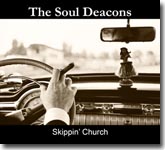 Another blue-eyed soul group that knows how to cook is The Soul
Deacons, from New Mexico. These cats have been around for a while
and have built up a good reputation in the western half of the nation.
Another blue-eyed soul group that knows how to cook is The Soul
Deacons, from New Mexico. These cats have been around for a while
and have built up a good reputation in the western half of the nation.
The self-released Skippin' Church, the Deacons' third release,
starts strongly with a cover of the Trammps' soul classic "Hold Back The
Night," featuring smooth, soulful vocals from frontman Brother E.
Clayton.
Brother E. really gets down on the Wilson Pickett cover "Don't Let The
Green Grass Fool You." Another favorite here is The Soul Deacons' cover
of Otis Clay's classic "Trying To Live My Life."
The disc ends with one of its strongest numbers, the sparse "You've Got
To Hurt," on which Brother E. Clayton is accompanied only by his own
piano playing, Steve O'Neill's B3 and Nick Thompson's tasteful sax solo.
Skippin' Church is a fun CD. If my duty as a reviewer compels me
to find something wrong with it, I'd say it's that the band sometimes
seems to be holding back, simmering on low instead of turning the heat
up to a boil. That's not likely a problem The Soul Deacons have outside
the studio. But it's a minor nit ... this is a good disc. Check
www.souldeacons.com
for more info.
--- Bill Mitchell
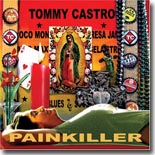 “Got my nose to the grindstone and I’m working like a mother.” This
lyric from "I’m Not Broken" accurately describes the hard working Tommy
Castro and his band mates. Superb production by John Porter and stellar
support from Randy McDonald on bass, Keith Crossan on sax and Chris
Sandoval on drums all contribute to the singular strength of Tommy’s
newest release on Blind Pig Records, Painkiller.
“Got my nose to the grindstone and I’m working like a mother.” This
lyric from "I’m Not Broken" accurately describes the hard working Tommy
Castro and his band mates. Superb production by John Porter and stellar
support from Randy McDonald on bass, Keith Crossan on sax and Chris
Sandoval on drums all contribute to the singular strength of Tommy’s
newest release on Blind Pig Records, Painkiller.
Tommy’s strong guitar work leads into the first cut, "Love Don’t Care," and
the sentiment is real. “Love don’t care and that’s a natural fact”, with
all its ups and downs, love will do what it wants. So enjoy it when it
grabs you and lament it when it’s gone. Despite what you may or may not
want, “Love don’t care!”
"I’m Not Broken" is an ode to everyday living. “I
may be down but I’m not out….count me in until the bitter end!” Life may
be cruel sometimes but the message here is to persevere, as long as you
keep moving forward and trying, it will all work out. “I’m not on fire,
but I’m just smokin…I may be broke…you know I am…but I’m not broken!”
The title track, "Painkiller," testifies to the addictive nature of love.
Her good love is the only thing that will ease the pain of a heart
that’s hurting, “she has a gift of healing power…she works on me for
hours and hours…Painkiller….she helps me breathe!”
"Big Sister’s Radio"
takes us back to Tommy’s childhood and the airwaves that amazed him when
his sister left behind a transistor radio for him to listen to. “Only
had one speaker, only had one dial…so many DJs….so many miles away….you
ought to have heard the records they played….on my big sister’s radio!”
Memphis soul, New Orleans jazz, it all came to Tommy via the airwaves
and we’re better off for the stations that have influenced the
evolution…”man I didn’t know what I was getting in to….one transistor on
my big sister’s radio!!”
Coco Montoya lends his considerable guitar work to Tommy’s next cut, "A
Good Fool is Hard to Find." Tommy’s woman is about to leave him and is
subject to Coco’s insight as well as Tommy’s, “now baby if you leave
Tommy, it would hurt him to his soul…I just can’t understand why a woman
would be so cold…Now a good fool….a good fool is hard to find!” Coco’s
advice is to simply let her go and get ready to head out into the night
because….six, seven…maybe nine or ten women will be out fool shopping
this evening!”
"Err on the Side of Love" takes a different approach, there
are a million reasons why a relationship may work and a million why it
won’t…”but all things considered…I think we got a shot…time alone will
tell whether we make it or not.” So in Tommy’s opinion the best thing to
do is “err on the side of love.” You never know, the relationship just
might work.
Brilliant sax work by Keith Crossan provides the intro for "I Roll When I
Rock." Bonnie Hayes wrote this song with Tommy and provides the
background vocals as well. “People running faster, heading for
disaster…I’m more like a slow train…take all night…but I’ll get you
there all right.” It’s okay to not always be the lead dog, sometimes slow
but steady is the only way to get anything done.
Angela Strehli joins
Tommy for a duet on "If You Believe (In What You Do)." “Just believe in
what you do…if others have…why can’t you…you’ll find that it’s true…if
you keep trying…you’ll make it through.” As long as we all have faith
and keep moving forward we’ll accomplish great things, the key is just
to “believe in what you do!”
“I opened up my eyes…I’m just about to think…funny how time flies…when
I’m fast asleep….I remember what you said…I wonder why it is…every now
and then…when you're not…" "It’s That Time Again." Time again to evidently
move on and find a new love.
"Goin’ Down South" finds Teresa James
backing Tommy on piano and singing background vocals as they pay homage
to the slower pace of life that is often found in the south. “Some
people say I’m just running away….I’m going down south where I don’t
have to hurry…and I ain’t gonna worry no more!”
Tony Stead’s B3 works lends an eerie intro to the next cut, "Lonesome and
Then Some." “If you’re not expecting someone…can I buy you a cup of joe…my
train don’t leave till morning…got nowhere to go…I’m not looking for the
right one…I’m not looking for the wrong one…I’m just looking for someone
who’s looking for someone like me….I’m lonesome…and then some…I’m blue
as a man can be!” There are times where just having someone to hold
makes all the difference in the world and Tommy’s loneliness just cries
out the need for company. While I love the sense of wonderment found in
"Big Sister’s Radio," this is my favorite cut on the CD. Brilliant guitar
work compliment Tommy’s vocals to convey the utter sense of desperation
that he feels.
The final cut on Painkiller, "It Ain’t Easy Bein’ Me,"
features David Maxwell’s wonderful keyboard work as Tommy reflects on
the life he’s led. “It never was easy being me….I know a little about a
lot…I need a lot more of what I haven’t got…learned everything the hard
way…nothing ever came for free…never learned a lesson, 'til I learned it
twice…it ain’t easy being me!” Tommy’s right, its not easy being him!
Painkiller reflects the maturity Tommy’s acquired over the years
(despite his protests to the contrary) and is a very strong record. John
Porter’s excellent production work, outstanding work by Tommy’s band and
the guest contributions of Coco Montoya, Angela Strehli, Teresa James
and David Maxwell all contribute to what is I think Tommy’s finest
record to date. Enjoy Painkiller; it might not cure everything that ails
you but it will go a long way toward helping you feel better!
--- Kyle Deibler
The publicity flyer for the Rounders' first release on Blind Pig
Records, Wish I Had You, states that they are out of the box
thinkers. That’s true. It also quotes guitarist Ryan Taylor as saying,
“I don’t know if there’s a unifying thread for the songs on this
album….” that’s true as well. Traditional blues fans will probably not
like this record, but there is a segment of the blues audience that will
definitely appreciate it. Blues continues to evolve as a musical genre
just like all of the rest and Wish I Had You is definitely a
departure from tradition.
"God Knows I’m Trying" opens with a solid backbeat reminiscent of the
North Mississippi Allstars and laments a love gone bad. At some point
Ryan’s woman just lost interest in the relationship and no matter how
hard he tries, this one just won’t work. “I wish I had you for
myself…cause I don’t want to see you with no one else” leads the
listener to the title track of the record, "Wish I Had You." Lead singer
Brian Whitten laments his inability to woo the woman of his dreams.
“There ain't but one thing that I crave…and I believe it will lay in my
grave.” The love he feels for this woman will follow him for the rest of
his life.
"My Getaway" finds Brian constantly in trouble and moving from town to
town. Some scorching guitar work by Ryan Taylor and Michael Stone
contributes to the sense of angst Brian feels at always being on the
run. “Cause I’m bound for traveling…a hundred miles a day…I can’t stand
here waiting to make my getaway….making my getaway, Lord!” Country
picking provides the introduction to "You Know Better Than That." “And I
expect a whole lot more than what I got before,” Brian’s woman has
evidently chosen someone else who has more money that Brian and his
expectation just won’t be met.
Wicked harp provided by Dustin Arbuckle of Moreland, Arbuckle & Floyd
leads the way in "Through No Fault of My Own." “Through no fault of my
own I found there is no hope for me….this trouble is killing me….oh
lord, it’s killing me.” We never know for sure what the trouble is that
Brian refers to but the outcome can’t be good.
“I don’t love you anymore boy, I think I found another today” lets Brian
know that he’s not the one in "Oh, My Dear Mind." “Oh, my dear mind…now
you’re gone a second time.” Time to regroup and move on.
“Imagine that she’s gone, imagine that she’s left,” intones Brian
lamenting the cause of another love gone badly. “Tell me what you do…to
make her blue…and don’t you know what she said…to be with me…to get from
me…you’re better off…makes me sad.” "When It’s Bad" is almost a dirge to
love lost. Probably the most depressing song on the record. Love doesn’t
improve, according to "Oh Why." “She never stopped to say hello…oh why,
tell me why.” “Went downtown to get my ashes hauled….now she said honey,
that’s against the law.” Brilliant country style picking provides an
interesting contrast to the lyrics of "Oh Why."
The rhythmic backbeat of hill country blues returns in"Let Me Talk at
You." “Let me talk at you…I’m not going to beg your pardon….no, that I
will not do…I was going to trust you but I have no way to know…if you’re
gonna want me…tell me the truth or nothing at all!” Brian is looking for
a commitment that may not come.
"Wait For Me" finds Brian still in search of a positive outcome. A solid
harp intro leads to Brian pleading his case…”If I change my ways….will
you wait for me?” “If I treat you right…will you wait for me?” If you’ve
got to ask the question then the answer won’t be good. Brian, you should
have been good to the girl all along.
“Take my suitcase baby…leave my trunk behind…I know by that little
darling….I can come home anytime” is the opening lyric to "Leave My
Trunk Behind." Evidently, Brian’s woman has been unfaithful and “I ain’t
coming back until you reap just what you sow.” Time to leave this one
behind.
A hopeful Brian sings…”It wasn’t my baby that hung your clothes up by my
door…does my one and only not love me any more?” in "It Wasn’t My Baby."
Brian’s woman is stepping out and it was his baby that brought her
backdoor man breakfast in bed, “does she think that I… don’t have the
nerve to kill her dead!” One has to think that her time on this earth is
very short.
Wish I Had You closes with "Goodbye, George." “All I ever
wanted…all I ever wanted….was to tell my friend goodbye…instead I ran
away from him so I could wait for him to die.” Brian couldn’t face his
friend dying and he passed away before he could summon up the courage to
tell his friend goodbye.
Records like Wish I Had You need to be made to encourage artists
to stretch their boundaries. I think the best work of the Rounders is
yet to come and the quality of their musicianship is undeniable. These
guys are good players. I’m a listener who appreciates the details in
music, and at times the wall of sound approach of the Rounders is
overwhelming. This record won’t appeal to everyone and that’s okay. The
segment of the blues market it does appeal to is vital to the future of
the genre and that’s what matters the most.
--- Kyle Deibler
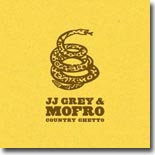 I’m consistently impressed by Bruce Iglaurer’s ability to think outside
the box and sign artists to his label that produce incredibly soulful,
funky albums that would not be considered blues by the purists, but do
appeal to the blues audience. The signing of JJ Grey & Mofro to
the Alligator label is one such example. Their latest record, Country
Ghetto, is an absolutely delightful blend of soul, southern rock and
funk that is hard to put away. I’ve had numerous people tell me about
Mofro over the last couple of years and although I still have yet to
catch a live performance by them, Country Ghetto is a testament
to their Southern roots, their maturity as songwriters and performers,
and reflective of just how comfortable JJ and the band are in their own
skins.
I’m consistently impressed by Bruce Iglaurer’s ability to think outside
the box and sign artists to his label that produce incredibly soulful,
funky albums that would not be considered blues by the purists, but do
appeal to the blues audience. The signing of JJ Grey & Mofro to
the Alligator label is one such example. Their latest record, Country
Ghetto, is an absolutely delightful blend of soul, southern rock and
funk that is hard to put away. I’ve had numerous people tell me about
Mofro over the last couple of years and although I still have yet to
catch a live performance by them, Country Ghetto is a testament
to their Southern roots, their maturity as songwriters and performers,
and reflective of just how comfortable JJ and the band are in their own
skins.
Unmistakable Southern rock roots are reflected in the first cut, "War."
Powerful bass and guitar paint a palette of conflict as JJ examines the
various methods of war, the actual physical combat and the mental
conflicts that exist within everyone. “There’s a war going on…and the
world’s about to die a sacred home!” There are times where the mental
wars are more difficult fights than the ones fought on land, and "War"
causes us to examine those inner demons that trigger our need for “war.”
Contrasted to "War" is the love song, "Circles." “Say that I want
you…but I don’t know how…if I could make it right….you know that I
would….please forgive me for whatever some other man did to you before I
came along.” Relationship conflicts are often rooted in the failure of
past relationships and the pain caused can hinder the growth of new
relationships. "Circles" is all about letting go and moving forward,
escaping the patterns of the past.
Some wonderful harp work by JJ Grey introduces the anthemic "Country
Ghetto." JJ is proud of his Southern roots and "Country Ghetto" reflects
pride in his heritage. “No I’m not saying that the only voice that
speaks for me speaks from this clay…but boy you ain't never take a dime
from the man…starve to death before you live by government
hand-out….they call this poverty…life in a country ghetto!!” He may be
poor, but he’s proud and will work every day of his life in search of
his dreams.
Piercing guitar licks provide the introduction to "Tragic." “He was
strong, he was proud…now he’s counting back the days to what went
wrong.” Mistakes can haunt a man and bring him to his knees. Tragic is
the tale of one man who succumbed to all that went wrong.
"By My Side" lets us know just how powerful a force we can be with
someone beside us who cares and is willing to fight the good fight with
us. “I ain't goin' nowhere….I ain't gonna hide…I ain't nowhere…with you
by my side.”
On "Palestine" is a story from JJ’s childhood. The area around Lake
Palestine in Florida was a prime source of timber, and the powers that
be worked to run folks off their land. “He made a stand…he would not
run…he dropped a hoe…picked up a gun…and then one night he
disappeared….it fed the worst of all their fears.” Good men and women
died fighting to keep the homes they worked all their lives for.
"Turpentine" continues the story with what happened after all of the
folks lost their lands. Many went to work in camps clearing timber that
sprang up around company stores that supplied them with their goods.
Many of them never escaped, being indebted to the stores for the goods
that they purchased. “Deep in the piney woods…breathe it until your head
aches….working for six dimes….breathe it 'til the sun goes down.” Times
were tough in the work camps and everyone lived in abject poverty
working to make a living and paying the bills owed to the company store.
We leave the misery behind to focus on good love. "A Woman" tells us
everything we need to know to earn and keep the love of a good woman.
“So you got to buckle up and face that stormy weather together….that’s
how a woman needs to be loved by her man.” The voice of experience is
imparting a worthy lesson for all those in love. "Mississippi" takes us
down a different path. JJ’s from Florida, but life in Mississippi has
been good to him as well. “Good things are going on…there in
Mississippi…She made me feel good…there in Mississippi!”
The music slows way down in "The Sun is Shining Down." There’s a point
in everyone’s life where they take a moment to reflect on what it meant
to be loved and to be home. “Glory, Glory…Hallelujah…the sun is
shining…shining down…Glory…Glory…Hallelujah…I’m alive and the world is
fine.”
Country Ghetto closes with the song, "Goodbye." JJ writes in the
press notes for Country Ghetto that “sometimes the thing that does you
the most harm is the hardest thing to part from. The painfulness of
saying goodbye at times will help the heart heal from all that has
caused it pain in the first place. “So hard to say….goodbye!”
I’m impressed with Country Ghetto. This is the third release by
JJ Grey & Mofro, their first on Alligator, and it showcases a mature
songwriter and band who have found their stride within the context of
their music. This is a band that has earned its reputation and following
one fan at a time, and I’m sure that there’s a great chance Country
Ghetto will be on a number of top ten lists at the end of the year.
--- Kyle Deibler